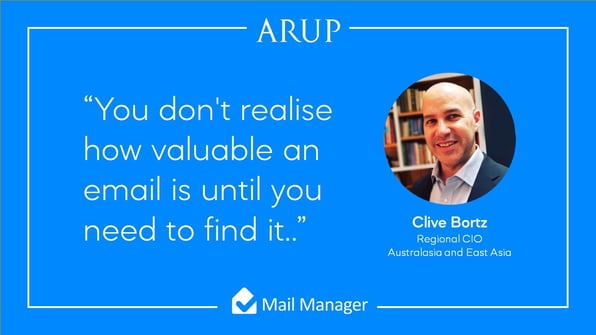We are delighted to have Clive Bortz join us from Arup Australasia & East Asia for our latest Q&A. Clive is CIO of Arup Australasia & East Asia has been at Arup for 10 years. He is part of the digital technology leadership team & oversees digital strategy across the 28 Arup offices in the Asia Pacific region. His key responsibilities cover meeting business requirements which are both internal as well as supporting effective project delivery to meet client demand.
Read the Q&A below to hear his thoughts on Arup's tech agenda, the role of emails in projects, using Mail Manager across the business, and more:
What’s on your agenda strategy-wise at the moment?
- Our full cloud programme – anything which can run on the cloud.
- Automation – some good examples of using workflows for repetitive tasks which the fee earners do.
- Data Management & Analytics.
- Digital Transformation.
What’s your experience of Mail Manager?
I’ve been using it for over 10 years.
As a technology leader, how have you found it?
It’s become part of the fabric for the company, as maintaining records has been critical to us. Mail Manager is part of a broader Project Information Management strategy as it integrates with our Document Management system.
What are your thoughts on the role email plays in today's ever changing project communication methods?
I think many people thought email was going to be replaced by collaboration platforms, but email is constantly the default and if anything the volume is increasing. I think when you want to formalise something outside of a ‘chat’, email is the industry default and maintaining that record is really important.
When has Mail Manager proved helpful in the past?
Often when there is an issue or dispute on a project, retrieval becomes critical and without Mail Manager things would just be buried in mailboxes. This represents challenges from an IT point of view, but also we want the right information to be in front of the right people, so Mail Manager acts as a constant reference for a Project Manager.
Whether it’s legal discovery or follow up work, piecing a project together with more than one person on it would be a significant piece of work.
What sort of information might this be?
Any information which is important to the whole project team such as key correspondence, project actions, evidence. Critically, if we want to find out why something was done, an email inevitably explains it.
Do you think it’s relevant for smaller firms as well?
Yes, being a consultant, the quicker you get the information you need, the quicker you can do the things you want to do and provide a better service to clients.
What effect do you think Office 365 has had on how people manage their Inbox?
I think in some ways there’s less inclination to file, as previously there was strict inbox limits. Office 365 is great but there is a danger it makes people less disciplined when it comes to organising their emails, and just having a load of information in an Inbox isn’t ideal.
Managing mailboxes when we were on premise, people had to file. Office 365 is great but it can make people less disciplined when it comes to organising their emails.
What other benefits do you think there are outside of managing risk?
The time savings are there when I’m working with a team, and there’s things which they all need to know, and not everyone needs to or wants to be cc’d in to every email. It’s really easy to waste time looking or chasing information the whole team really needs to see.
If you are working in a team, the focus has to be on the wider benefit of that team, particularly when there’s a huge volume of email.
What do people say about Mail Manager, if you were to get rid of it?
The longer you’re using Mail Manager, the more you appreciate how critical it is. You don’t realise how valuable an email is until you need to find it.

What’s it like training across a region of 28 offices?
For a solution like Mail Manager, it forms part of the process in which projects are delivered, although it’s important to communicate the importance of filing emails. In the same way you’d have a document management process, and communicate the importance of following that.
Thank you Clive!










